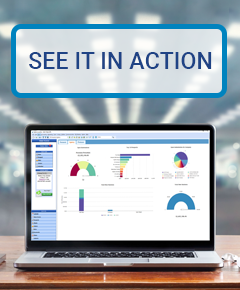
Marketing, Sales, Technology Trends
If you think gaining insurance referrals is more effort than it’s worth, you’re underestimating both the ease of gaining referrals and the impact of the payoff. Nielson found 84% of consumers trust recommendations or referrals over all other forms of marketing, and people referred by a friend are 4x more likely to make a purchase. Deloitte found those referred customers have a 37% higher retention rate than other customers.
(more…)

Marketing, Sales, Technology Trends
Digital insurance matters. According to McKinsey & Company, agencies that “digitally transform stand to gain satisfied customers, lower operating costs, and achieve higher growth.” Going digital doesn’t mean moving all your operations to A.I. and forgoing a physical location; it simply means moving towards meeting customer needs, improving processes, and protecting your business.
What are the first steps to harnessing the digital insurance landscape? Below are the tools and training your agency needs to get started.
Learn more about customer demand for digital agencies on our blog
Your Top Digital Agency Tools
- Your
agency website. J.D. Power found 74% of insurance shoppers used agency
websites or aggregators to research and obtain quotes before purchasing
insurance. You need to have a website that’s easy to find and navigate to stay
in the game.
- Social
media. You don’t have to post daily
on all possible platforms, but you do need a presence. Social media gives you a
way to connect with customers and prospects to hear what they need and give
feedback on their concerns. And it boosts your visibility.
- Customer
self-service options. This includes
a Client Portal and mobile access. Self-service options increase customer
satisfaction and reduce time and energy spent on assisting customers who can
help themselves. Agency Nation found one agency that added a client portal, “…increased
client retention to 93% and saved $70,000 in COI labor, printing and postage
expenses per year.”
- CRM
and marketing automation. Both
tools are designed to streamline your agency’s operations and improve your
ability to identify and convert leads and understand your customer’s needs.
- Paperless
options. Digital lines download and
digital document signing, sending, and storage not only get business done
faster (downloads alone can save up to 60 minutes per employee per day), it can
save hundreds annually in printing and postage as well.
Get more details on how to leverage digital tools to improve agency lead generation and conversion
Top Team Training for Digital Agencies
- Agency management system training. Your
management system is your agency’s central processing tool and you and all your
staff need to know how to use it in the most efficient, digitally-compatible
way. Modern systems offer client portal, CRM, and marketing automation
integration. You need to understand how each capability can best serve your
customers and your agency.
- Website training. Your agency website
is not a “one and done” situation – it should be dynamic. You need someone
in-house who understands how to update information on your site to stay
accurate and relevant.
- Social media training. This one may
come as a surprise. Although social media is relatively easy to implement and
understand, you should talk with your team about how their personal social
media use reflects on your agency. Especially for independent,
community-focused local agencies, when your team says something outside the
office they could be construed as speaking for your agency. Be clear on what is
appropriate.
- Cybersecurity training. With all the
benefits of digital tools comes the threat of cyber-attacks. In
an interview with Insurance Business Magazine, Ron Berg, executive director of Agents Council for Technology
(ACT), part of the Independent Insurance Agents and Brokers of America (IIABA),
said insurance is the fourth most attacked economic sector. Educate your
staff on what risks exist, how to spot and avoid attacks, and what to do should
your agency experience a cyber-attack.
Get our full guide to Cybersecurity for the Digital Insurance Agency here
Get the Right Tools and Training in One Place
We work with our agency clients and industry
experts, like our partners at Agents Council for Technology (ACT) and IVANS,
every day to identify the most powerful digital insurance tools. Thanks to
these collaborative efforts, we’re confident our Partner
Platform agency management system suite offers the best and most effective
capabilities to help agencies better serve their customers and grow their
business.
And we don’t stop at the “what” of digital tools
but go the extra mile with the “how.” With targeted agency trainings and
always-accessible online videos and guides, our Partner Platform agencies stay
informed and equipped. We also offer regular webinar trainings, focusing on
topics like cybersecurity and customer self-service tools.
Get to know more about the Partner Platform system,
including our service and training, at sispartnerplatform.com.

Marketing, Product Updates, Sales, Technology Trends
How old is your agency website? Do you have a
website at all?
If your answers are anything besides “Not very” and “Yes!” then it’s time for you to get working on updating or creating an insurance agency website. And one that works. Close to 40% of individuals surveyed said they would stop engaging with a site they found unattractive. Studies show it takes less than half a second for users to form an opinion about a website, so you have little time to make the critical impression that will get people to stay.
(more…)

Marketing, Sales, Technology Trends
It’s challenging to make a business stand out in any market. When it comes to insurance agency marketing, this can be particularly challenging due to the industry’s nature. How can you differentiate your agency when all agencies provide such similar services? While quality customer care, price, and ease of service are helpful, they can only so far.
How can you make your agency stand out? Consider
finding your niche.
Why Finding Your Agency Niche Matters
A recent
McKinsey & Co survey found agencies should focus on “well-articulated
value propositions targeted at a small number of customer segments…that require
more specific advice, tailored products and a greater degree of service.” Another
survey showed close to 50% of “middle-market insurance agencies”
specialized in products or industries, and that number is expected to rise to
two-thirds by 2022.
Why have so many agencies turned to specialization?
To make themselves stand out in a saturated market. When you’re known as “the
agency that does ‘X'” you have something that makes you known.
Specialization helps agency branding and Google ranking, too.
Targeting a niche market also improves service. With
a niche market, you can focus more time on one area, learning the ins and outs
of that product or industry. Greater expertise allows you to be nimbler so you
can see what’s coming and adjust your coverage and services faster than others.
And, it’ll speed up your workflow as you get to know client needs, processing
coverage and claims quicker.
Get to know more insurance marketing strategies to gain website traffic here
How to Identify and Leverage Your Niche
For specialization to be effective, you need to be
methodical in identifying and leveraging your niche. The steps are relatively
straightforward:
- Identify your agency niche. Look at your book of business and determine specializations. Target a service or product in which you have a relatively high amount of business and one in which you see growth potential. Niche areas include:
- Emergency vehicles fleets
- Online commerce businesses
- School districts
- Family farms
- Active military members
- Learn how to serve your niche. Analyze
data from your CRM, marketing automation, or other data tools to identify
marketing tools and methods that resonate with your niche market. You may also
consider hiring an outside agency to conduct market research.
- Adapt your website. This is where
your Google ranking comes into play. Add keywords associated with your niche to
your website URL, include it in the homepage name, and create pages and posts devoted
to your niche. The more related keywords you have on your site, the higher you’ll
climb in Google.
- Market your niche. The final step is
getting the word out about your specialty—leverage marketing
automation to post on social media and create email campaigns around your
niche. Get in touch with clients and ask them for referrals in your niche area
and testimonies about your service. The more you can spread the word, the
better.
See how to leverage marketing automation and your CRM to gain more business
Get the Tools You Need with Partner Platform
Whether it’s an integrated
CRM, marketing
automation, or website
upgrade, the Partner Platform team has the tools you need to identify and
leverage your niche for maximum market impact. With custom
dashboards and reporting and targeted training and customer support, the
Partner Platform team and system can help you understand your agency niche and
help you better serve your customers.
Find out more about how our team can help your
agency succeed. Get in
touch at [email protected] or 800.747.7005,
Option 6.

Marketing, Sales, Technology Trends
If you’re like most independent insurance agencies,
you’ve got service down. Referrals are coming in thanks to your stellar
performance, but it’s still not enough to keep your pipeline flowing. You need
to invest in the right insurance systems and strategies to gain the leads you
need to grow. We’ve got you covered.
5 Steps to Gain Insurance Leads
Let’s start with the steps to take. Surprisingly,
it’s not as complicated as you’d think to put a lead generation and conversion
plan into place.
- Get Data. Find out what your current customers are responding to, get to know what’s bringing in prospects, and have a place to store all of it. You can also leverage market research, conducting your own, or hiring an outside provider to get a pulse on what’s happening in your market.
- Analyze Data. Use that data you’ve gathered to find out what’s working and what’s not. And, identify different prospect segments: look for groupings like lost opportunities, client proximity, or similar policy needs. Studies show marketers have seen up to a 760% increase in email revenue thanks to segmentation.
- Create a plan. Now that you know what’s working and the groupings you need to target, define how you’ll do it. Establish targeted outreach campaigns for each segment, including a defined outreach script, cadence, and marketing content.
Get to know more about outreach
content and cadence from our parent company, NuGrowth Solutions
- Ready your team. A plan is only as good as those who execute it. Help your team understand the how and why of your outreach strategy and assign producers to enact specific prospect segment strategies. Consider bringing in an experienced development team to train and coach your team as you start up: this defined, strategic methodology may be a new and uncomfortable approach at first.
- Assess results and repeat. Keep track of how each element of your strategies are performing. Use quantitative data from stats like click-through or meeting set rates, but don’t make it your only source. Leverage your producers to get qualitative feedback on conversations and what prospects are saying. Keep tracking, recording, and analyzing your results, making adjustments along the way to continually improve performance.
Need outside sales help? Check
out this post from our parent company
The Top 3 Insurance Systems You Need to Gain Leads
So, you need to track, store, and analyze data –
but where? With what? How? There are three systems you need to gain the necessary
data and sales insights.
- Marketing Automation. Designed to
streamline and automate marketing tasks, marketing automation helps you create
and implement targeted outreach campaigns and track results.
- Customer Relationship Management system
(CRM). CRMs bring together the quantitative and qualitative data you need
in a one-stop-shop for your prospect information. Leverage a CRM to implement
targeted outreach strategy and record detailed data on outcomes. And, a CRM
keeps you on track with maintaining outreach through reminders and updates.
- Integrated
communication tools. Specifically, integrated texting and email tools. With
integrated communication tools, you’re guaranteed to capture every conversation
in your CRM for easy reference and data analysis.
Get the Sales Tools You Need from Partner Platform
We’ve brought all the sales tools your agency needs
to one system with Partner Platform. Our Partner XL sales and marketing system
brings our Marketing
Automation Manager and Producer
Results Manager CRM together in one system, so you don’t need to import and
export management system data for sales. And, our integrated
email and texting sync all your communications in one place.
Beyond these tools, Partner Platform comes
equipped with top-of-the-line reporting
and analytics, customized for the insurance agency, and targeted
system training to help get you up and running.
Discover how the Partner Platform system and the team can work for you. Get in touch at [email protected] or 800.747.7005, Option 6, to find out more.






